Current Book List for Green Cat Books
Alphabetically by Title
 Presenting classical readings in science in an affordable, modular format.
Presenting classical readings in science in an affordable, modular format.
This page lists the first five modules in the series of Science Classics for Humanities Studies from the Green Cat imprint. This is a series of study modules designed to bring fundamental works of science and mathematics within the grasp of students and other readers without the need for specialized preparation. The series reflects the Green Lion’s conviction that an understanding of science, and especially of the classical works of science, is essential for all students of the humanities.
Each volume in the series is a compact, inexpensive presentation of classic scientific and mathematical texts, offering generous but judicious guidance for the reader. We have drawn on our many years of reading these books with non-specialist students to choose selections of real substance, and to provide help that makes the texts accessible while at the same time allowing the original texts to speak for themselves, in their own voices. (more info about Green Cat books)
For more information about a specific book, including price and ordering information, click that book's cover or title.
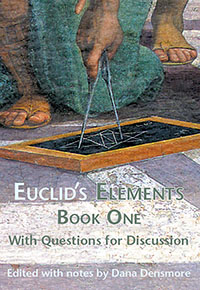 Euclid's Elements Book One with Questions for Discussion
Euclid's Elements Book One with Questions for Discussion
Edited with Questions for Discussion by Dana Densmore
The opening book of Euclid's classic, for study of Euclid in the context of the humanities.
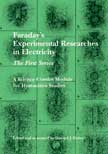 Faraday's Experimental Researches in Electricity: The First Series
Faraday's Experimental Researches in Electricity: The First Series
Howard J. Fisher
Faraday explores a new relation between magnetism and electricity. As we follow his narrative we can both witness and participate in his thinking, his questioning, and his insights. Includes introductions, notes, and supplementary diagrams.
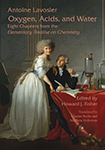 Oxygen, Acids, and Water: Eight Chapters from the Elementary Treatise on Chemistry
Oxygen, Acids, and Water: Eight Chapters from the Elementary Treatise on Chemistry
Antoine Lavoisier
with Introduction and Notes by Howard J. Fisher
Lavoisier shares with poets a deep concern for getting the words right. Of his Treatise, he writes, "while my sole intention
was to perfect the language of chemistry, my work, in a manner I could not resist, imperceptibly transformed in my hands into an elementary treatise on chemistry" The result is both revolutionary and accessible.
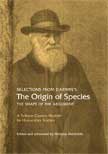 Selections from Darwin's The Origin of Species: The Shape of the Argument
Selections from Darwin's The Origin of Species: The Shape of the Argument
Nicholas Maistrellis
The substantial passages provided in this edition allow one to enjoy the precision and clarity of Darwin’s writing and the patient thoroughness of his reasoning. Step by step, layer by layer, detail by detail, like an intricate detective story, he constructs his case.
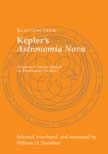 Selections from Kepler's Astronomia Nova
Selections from Kepler's Astronomia Nova
William H. Donahue
This book has the complete introduction to Astronomia Nova, which gives us Kepler's views on the planetary systems debate. The Introduction is followed by a substantial selection of chapters presenting Kepler's new celestial physics.
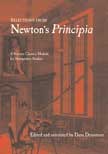 Selections from Newton's Principia
Selections from Newton's Principia
Dana Densmore
Traces the basic development of universal gravitation. Has Newton's text with notes, commentary, questions for discussion, and additional diagrams.
More Information About Green Cat Books
SCIENCE CLASSICS FOR HUMANITIES STUDIES is a series of study modules designed to bring fundamental works of science and mathematics within the grasp of students and other readers without the need for specialized preparation. The series reflects the Green Lion’s conviction that an understanding of science, and especially of the classical works of science, is essential for all students of the humanities. Science, no less than poetry or philosophy, is human thought, a response both to the outer world of our senses and the inner experience of our consciousness. The more profound a scientific work is, the more directly it addresses itself to our humanity; therefore, there is much in the greatest works of science that can be grasped without special preparation. Yet too many educational programs find themselves limited by the supposed divide between the humanities and the sciences — the so-called “two cultures.”
Further, teachers and institutions who wish to heal this unnecessary fracture have had to confront two discouraging barriers. On the one hand, classic texts of real science are often found to be forbiddingly technical in content and burdened with terminologies either antiquated or arcane. On the other hand, popularizations of these classics insulate students from the actual workings of thought and imagination that classic texts embody. Green Lion Press has addressed this dilemma with the series SCIENCE CLASSICS FOR HUMANITIES STUDIES, issued in slim, inexpensive student editions under the Green Cat Books imprint.
Besides humanities students, this series will be of interest to those interested in science but lacking time or expertise to read these works unabridged and without assistance. It will also serve readers who already enjoy a technical background but who may wish to experience more directly the sources of contemporary scientific concepts.
Classic works of science and mathematics, no less than other works of literature, drama, and philosophy, lead us to questions (and answers) that may enlighten or delight us, or may lead us to a new understanding of the multiplex and often conflicting views of reality presented in great scientific works. It is the Green Lion’s aim to enable readers not only to observe but to participate in such significant achievements of thought.
